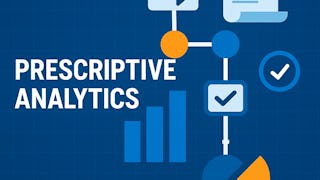This course is designed to impact the way you think about transforming data into better decisions. Recent extraordinary improvements in data-collecting technologies have changed the way firms make informed and effective business decisions. The course on operations analytics, taught by three of Wharton’s leading experts, focuses on how the data can be used to profitably match supply with demand in various business settings. In this course, you will learn how to model future demand uncertainties, how to predict the outcomes of competing policy choices and how to choose the best course of action in the face of risk. The course will introduce frameworks and ideas that provide insights into a spectrum of real-world business challenges, will teach you methods and software available for tackling these challenges quantitatively as well as the issues involved in gathering the relevant data.


Operations Analytics
This course is part of Business Analytics Specialization



Instructors: Senthil Veeraraghavan
127,766 already enrolled
Included with
(5,138 reviews)
Skills you'll gain
- Supply Chain Planning
- Strategic Decision-Making
- Forecasting
- Data-Driven Decision-Making
- Business Modeling
- Simulation and Simulation Software
- Demand Planning
- Business Operations
- Business Analytics
- Operations Management
- Inventory and Warehousing
- Analytics
- Excel Formulas
- Predictive Analytics
- Operational Analysis
- Descriptive Analytics
- Process Optimization
- Data Analysis
- Decision Making
- Risk Analysis
Details to know

Add to your LinkedIn profile
8 assignments
See how employees at top companies are mastering in-demand skills

Build your subject-matter expertise
- Learn new concepts from industry experts
- Gain a foundational understanding of a subject or tool
- Develop job-relevant skills with hands-on projects
- Earn a shareable career certificate

There are 4 modules in this course
In this module you’ll be introduced to the Newsvendor problem, a fundamental operations problem of matching supply with demand in uncertain settings. You'll also cover the foundations of descriptive analytics for operations, learning how to use historical demand data to build forecasts for future demand. Over the week, you’ll be introduced to underlying analytic concepts, such as random variables, descriptive statistics, common forecasting tools, and measures for judging the quality of your forecasts.
What's included
5 videos1 reading2 assignments
In this module, you'll learn how to identify the best decisions in settings with low uncertainty by building optimization models and applying them to specific business challenges. During the week, you’ll use algebraic formulations to concisely express optimization problems, look at how algebraic models should be converted into a spreadsheet format, and learn how to use spreadsheet Solvers as tools for identifying the best course of action.
What's included
6 videos1 reading2 assignments
How can you evaluate and compare decisions when their impact is uncertain? In this module you will learn how to build and interpret simulation models that can help you to evaluate complex business decisions in uncertain settings. During the week, you will be introduced to some common measures of risk and reward, you’ll use simulation to estimate these quantities, and you’ll learn how to interpret and visualize your simulation results.
What's included
4 videos1 reading2 assignments
This module introduces decision trees, a useful tool for evaluating decisions made under uncertainty. Using a concrete example, you'll learn how optimization, simulation, and decision trees can be used together to solve more complex business problems with high degrees of uncertainty. You'll also discover how the Newsvendor problem introduced in Week 1 can be solved with the simulation and optimization framework introduced in Weeks 2 and 3.
What's included
6 videos1 reading2 assignments
Earn a career certificate
Add this credential to your LinkedIn profile, resume, or CV. Share it on social media and in your performance review.
Instructors

Offered by
Explore more from Business Strategy
 Status: Free Trial
Status: Free TrialUniversity at Buffalo
 Status: Preview
Status: PreviewO.P. Jindal Global University
 Status: Preview
Status: PreviewUniversity of Amsterdam
 Status: Free Trial
Status: Free TrialUniversity of Illinois Urbana-Champaign
Why people choose Coursera for their career




Learner reviews
5,138 reviews
- 5 stars
76.50%
- 4 stars
19.03%
- 3 stars
3.32%
- 2 stars
0.58%
- 1 star
0.54%
Showing 3 of 5138
Reviewed on May 19, 2016
3 1/2 stars+ Good lectures+ Valuable introduction to solver and stochastic modeling~ Little beyond basics: for a Wharton specialization we should add more depth~ Quizzes are at least a bit too easy
Reviewed on Sep 5, 2019
Really enjoyed this course with not only learned the knowledge of operations analytics but also some excel tools I've never used or learned before. Great explanation on details in each week!
Reviewed on Mar 27, 2020
Very interesting & a carefully crafted course to kickstart with Operations Analytics. The professors very nicely elaborated complex topics in simple terms with understandable examples.

Open new doors with Coursera Plus
Unlimited access to 10,000+ world-class courses, hands-on projects, and job-ready certificate programs - all included in your subscription
Advance your career with an online degree
Earn a degree from world-class universities - 100% online
Join over 3,400 global companies that choose Coursera for Business
Upskill your employees to excel in the digital economy
Frequently asked questions
To access the course materials, assignments and to earn a Certificate, you will need to purchase the Certificate experience when you enroll in a course. You can try a Free Trial instead, or apply for Financial Aid. The course may offer 'Full Course, No Certificate' instead. This option lets you see all course materials, submit required assessments, and get a final grade. This also means that you will not be able to purchase a Certificate experience.
When you enroll in the course, you get access to all of the courses in the Specialization, and you earn a certificate when you complete the work. Your electronic Certificate will be added to your Accomplishments page - from there, you can print your Certificate or add it to your LinkedIn profile.
Yes. In select learning programs, you can apply for financial aid or a scholarship if you can’t afford the enrollment fee. If fin aid or scholarship is available for your learning program selection, you’ll find a link to apply on the description page.
More questions
Financial aid available,

